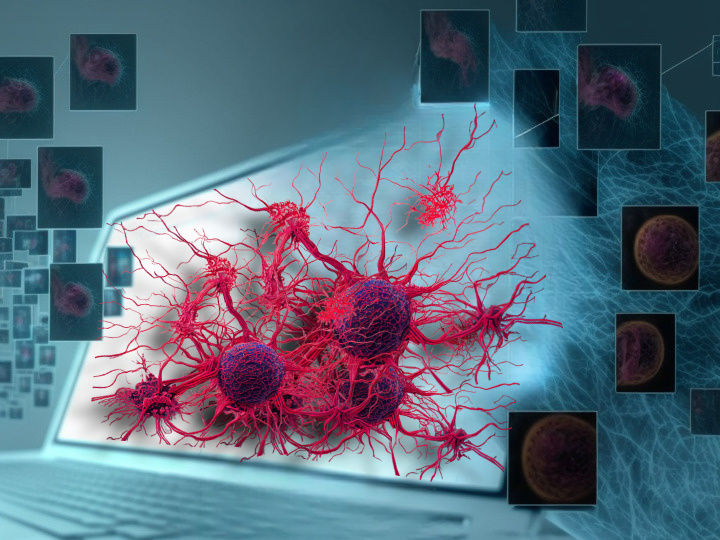Sinonasal cancer: AI facilitates breakthrough in diagnostics
Researchers have developed a method for classifying difficult-to-diagnose nasal cavity tumors
Although tumors in the nasal cavity and the paranasal sinus are confined to a small space, they encompass a very broad spectrum with many tumor types. As they often do not exhibit any specific pattern or appearance, they are difficult to diagnose. This applies especially to so-called sinonasal undifferentiated carcinomas (SNUCs).

Symbolic image
Computer-generated image
Now a team led by Dr. Philipp Jurmeister and Prof. Frederick Klauschen from the Institute of Pathology at LMU and Prof. David Capper from Charité University Hospital as well as the German Cancer Consortium (DKTK) ), partner sites Munich and Berlin, has achieved a decisive improvement in diagnostics. The team developed an AI tool that reliably distinguishes tumors on the basis of chemical DNA modifications and assigns the SNUCs, which the methods available before now have been unable to distinguish, to four clearly distinct groups. This breakthrough could open up new opportunities for targeted therapies.
Tumor-specific DNA modifications
Chemical modifications in DNA play a vital role in the regulation of gene activity. This includes DNA methylation, whereby an extra methyl group is added to the DNA building blocks. In earlier studies, the scientists had already demonstrated that the methylation pattern of the genome is specific for different tumor types, because it can be traced back to the tumor’s cell of origin.
“On this basis, we’ve now recorded the DNA methylation patterns of almost 400 tumors in the nasal cavity and paranasal sinus,” says Capper. Thanks to an extensive international collaboration, the researchers managed to compile such a large number of samples even though these tumors are rare and comprise only about four percent of all malignant tumors in the nose and throat area.
Original publication
Other news from the department science
Most read news
More news from our other portals
See the theme worlds for related content
Topic world Diagnostics
Diagnostics is at the heart of modern medicine and forms a crucial interface between research and patient care in the biotech and pharmaceutical industries. It not only enables early detection and monitoring of disease, but also plays a central role in individualized medicine by enabling targeted therapies based on an individual's genetic and molecular signature.

Topic world Diagnostics
Diagnostics is at the heart of modern medicine and forms a crucial interface between research and patient care in the biotech and pharmaceutical industries. It not only enables early detection and monitoring of disease, but also plays a central role in individualized medicine by enabling targeted therapies based on an individual's genetic and molecular signature.






















































